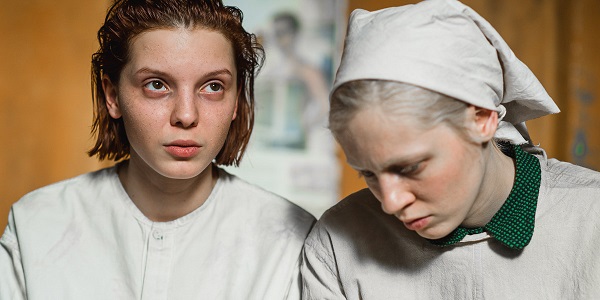
If I can offer a warning of sorts before I discuss why I love Kantemir Balagov’s Beanpole, it is this: it is not for the faint of heart. There’s a sensibility in European Art Cinema to strive to find human empathy in the cruelest of situations. And yet, the shock of said cruelty is undoubtedly jarring. It’s supposed to be. This is a film that metaphorically (and kind of literally) throws the baby out with the bathwater so to speak.
It is also a film comprised of boundless emotion. Balagov is just twenty-eight years old. He’s also probably a (literal) genius, supposedly having somehow become ostensibly fluent in English at some point between Cannes (where he won best director for the “B” competition) and a screening at TIFF I got the pleasure of being a part of. He’s clearly attempted to do his research with his second feature, having consulted the Noble Prize winning book The Unwomanly Face of War in the making of Beanpole.
Listen, none of us really know anything about movies. They’re incredibly subjective experiences that either work for you, or they don’t. We can argue till we’re blue in the face about the merits of the sad clown movie, but at the end of the day the success is inherently based on the emotions you feel for the people in world you’re apart of a couple of hours. If you felt it, good. Don’t let anyone tell you otherwise (some exceptions may apply).
I feel Beanpole. Balagov opens his film with a close-up of Iya’s (Viktoriya Miroshnichenko) face as painfully twists. She’s a nurse in post-war Leningrad. Our introduction to her instantaneously informs us that she is clearly working through some repressed traumatic stress. And that she must do so for a society that is reeling in the aftermath of its Great War. The Seige of Leningrad lasted for almost eight hundred days. And in this one shot you can feel the scars of almost every single one.
Iya is referred to as the titular Beanpole because of her height. Height that allows Balagov to shoot from interesting angles and create fascinating compositions. That opening close-up pulls away from Iya to her surroundings, and it’s one of the reveals of the year. We’re led to assume that the resultant cause of her trauma is wartime service that she served alongside Masha (Vasilisa Perelygina), a bright and colourful source of energy with a traumatic past of her own. The pair works together at a hospital where they take care of grievously wounded war veterans.
Perelygina provides the performance of the film. It’s one hell of a performance, and one that allows Balagov to emphasize close-ups of her expressive face. From our introduction to her Masha is dressed in red, and continues to be for most of the film; a stark contrast to Iya who is dressed in deep greens, and lives in a run-down apartment with green paint spackled haphazardly on the walls. This eventually switches, with Masha donning the green and Iya the red. See if you can figure out why.
The colours are one of the many ways that Balagov precisely directs Beanpole. This is some big “C” cinema, or maybe, big “K” kino if you prefer. It’s hard to not fall for the grand cinematicness of it all. In said Q&A at TIFF, Balagov mentioned how he intended for the film to touch upon the ways in which people use the control they have over physically spaces to act as a coping mechanism. This is a beautiful looking film.
But it’s also an ugly one, ripe with disturbing moments. The empathy that Balagov finds is in the recognition of the limited choices individuals may have in certain circumstances. There are few professions available to two Russian women, both of whom with varying degrees of post-traumatic stress, in a war-ravaged society. They must stick together, even as their relationship becomes increasingly fraught. There is both hope and pessimism present throughout this; the dual sides of a coin perpetually spinning in the air and waiting to land.
- Release Date: 2/28/2020


